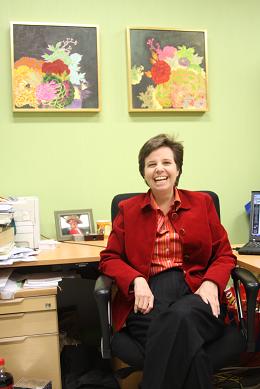
Willoughby, an Ewha professor since 2004, teaches Korean Traditional and Popular Culture and Music among other courses. She says she had always “lived in a musical world” and started composing tunes at the age of 4. She carried a passionate love for music when she first arrived in Korea as a full-time missionary in 1986. Her first vivid pansori experience that same year brought her back to Korea several times to study the music further. Her time in the country now adds up to eight and a half years.
When she first left Korea in 1987, she told a good friend she wanted to study Korean traditional music. “My friend’s immediate reaction was, ‘That’s great, maybe then you could have a job at McDonalds,’” said Willoughby. “The idea of studying a little-known genre of music must have seemed so impractical to him.”
Despite such discouragement, Willoughby’s prayers came through years later. Her original search for graduate schools that taught music therapy took a surprising turn when she found an orange flyer of Brown University with the words “ethnomusicology” on it. “I didn’t even know what ethnomusicology was at first. It just felt like destiny.”
Destiny is what Willoughby still feels today every time she listens to pansori. In her poem “Yunhoi (Korean word for reincarnation),” she writes how she found herself “at home” when she attended a pansori concert in Gochang, the birthplace of pansori, and was overcome with such unspeakable comfort she barely understood herself.
“The music personifies home,” Willoughby said. “Even when I felt frustrated with how helpless Choon-hyang (a fictional character in a Korean folktale) seemed through the eyes of a 21st century woman, I still had tears in my eyes after a pansori concert that very night. It just works in the music.”
Willoughby’s academic research is mainly based on the portrayal of women in pansori, but she also believes pansori has global appeal and has worked towards sharing her beliefs with the public. “The thing I love most about pansori is that the entirety of human experience is told in the stories. There is something so deeply profound, whether it is sorrow or deep catharsis,” said Willoughby. “Han (a Korean concept of deep anger or sorrow) is in fact a universal emotion. Such emotions embedded in the music will move listeners all over the world.”
Professor and devoted American advocate of Korean traditional music, Willoughby’s efforts have mostly been academic. Other efforts include organizing pansori concerts in the U.S, especially with better attendance, a narrator of pansori and an educated public. Another pressing matter for Willoughby is that pansori is losing its domestic appeal to the younger generation in Korea.
“It’s one thing to hear the music itself, but really experiencing it note by note and understanding its background is another thing altogether,” said Willoughby. “I’m working towards bringing down cultural and linguistic barriers of pansori for foreigners and making it more approachable for contemporary Koreans.”
Willoughby often sits down on the bamboo mat in her office to practice pansori, or sings some original verses to her students at the end of the semester. Her pansori lessons are in great progress. One day she may add actual performances to her efforts to globalize pansori. “We’ll have to find out.”

